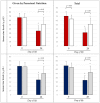Nutritional Intake Influences Zinc Levels in Preterm Newborns: An Observational Study
- PMID: 32093077
- PMCID: PMC7071515
- DOI: 10.3390/nu12020529
Nutritional Intake Influences Zinc Levels in Preterm Newborns: An Observational Study
Abstract
(1) Background: Zinc is a key element for protein synthesis in preterm newborns. Early aggressive nutrition, promoting protein synthesis, may increase zinc consumption; (2) Methods: We performed a prospective observational study, to assess the relationship between early macronutrients intake and serum zinc levels, in preterm newborns with Gestational Age (GA) of 24-35 weeks, consecutively observed in Neonatal Intensive Care Unit (NICU). (3) Results: We enrolled 130 newborns (GA 31.5 ± 2.8). A significant negative correlation between serum zinc level at 28 days of life and energy (r -0.587, p < 0.001) and protein intake (r -0.556, p < 0.001) in the first week of life was observed. Linear regression analysis showed that zinc levels depended on energy (β -0.650; p < 0.001) and protein (β -0.669; p < 0.001) intake given through parenteral nutrition (PN) in the first week of life; (4) Conclusions: zinc status of preterm neonates was influenced by early protein and energy intake. An additional zinc supplementation should be considered when high protein and energy intake are received by preterm newborns in the first week of life.
Keywords: VLBW; energy intake; parenteral nutrition; protein intake; refeeding syndrome.
Conflict of interest statement
The authors declare no conflict of interest.
Figures
References
-
- Hambide K.M., Krebs N.F. Zinc in the Fetus and Neonate. Elsevier; Saybders, PA, USA: 2004. Volume Fetal Neonatal Physiology.
Publication types
MeSH terms
Substances
LinkOut - more resources
Full Text Sources
Medical



